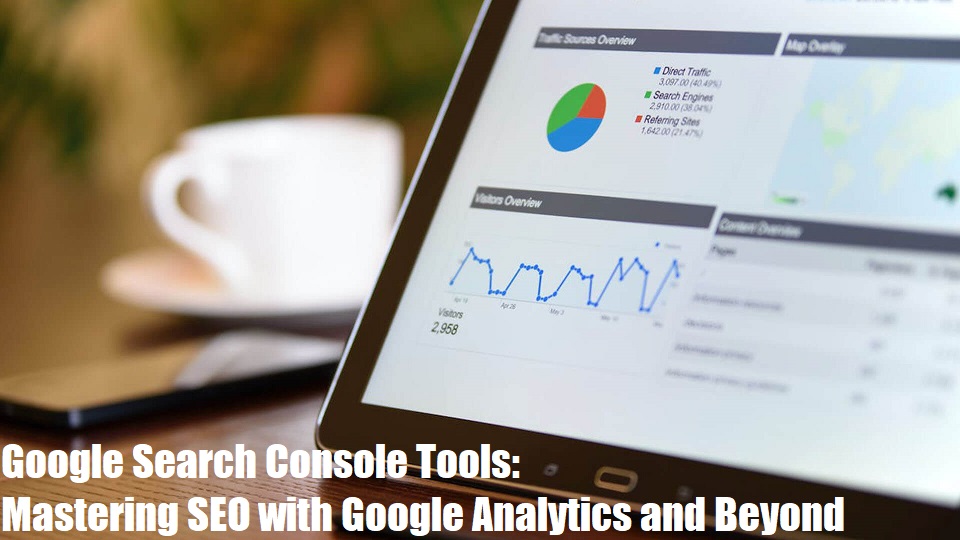
Google Search Console Tools
When it comes to search engine optimization (SEO), understanding the tools that empower us to make data-driven decisions is essential. Google Search Console and Google Analytics are two primary platforms every SEO professional should master. These tools not only provide insights into website performance but also highlight the areas where improvements are needed to increase rankings and organic traffic.
In this article, we explore the essential tools in SEO, focusing on Google Search Console and Google Analytics, and examine how these tools complement each other to enhance SEO strategies.
Which Tool is Used in SEO After Google Analytics?
Google Analytics is a vital platform in the SEO ecosystem, but once we have mastered it, there are other tools that provide further insights. One of the most critical tools used in SEO after Google Analytics is Google Search Console.
Google Search Console offers detailed reports on how Google views and indexes a website. It provides crucial data such as:
- Search queries that drive traffic to your site.
- Crawl errors that prevent your site from being indexed properly.
- Core Web Vitals which measure page speed and user experience.
- Mobile usability reports, ensuring your site is optimized for mobile devices.
While Google Analytics focuses on how users interact with a website (e.g., session duration, bounce rates), Google Search Console concentrates on how a website performs in Google’s search engine. This difference makes Google Search Console an indispensable tool alongside Google Analytics.
Other notable SEO tools include Ahrefs, SEMrush, and Moz, which provide competitive insights, backlink data, and keyword tracking. However, when it comes to direct integration with Google’s search engine, nothing is as crucial as Google Search Console.
What is Google Analytics? How Important is it in SEO?
Google Analytics is a comprehensive web analytics tool that helps us track user behavior on a website. It provides detailed reports on traffic sources, user engagement, and goal completions. By integrating Google Analytics with SEO strategies, we can:
- Track how users arrive at the website (e.g., organic search, direct traffic, referral sites).
- Understand the effectiveness of landing pages and call-to-action (CTA) buttons.
- Measure the overall user experience, such as time spent on the page and page load speeds.
Google Analytics plays a critical role in SEO by allowing us to:
- Identify high-performing keywords.
- Evaluate which pages retain visitors and convert traffic.
- Track organic traffic growth over time.
Without Google Analytics, it would be impossible to measure the success of our SEO efforts effectively. It offers real-time and historical data that enables us to adapt and refine our SEO strategies to maximize impact.
How Do Google Analytics and SEO Work Together?
Google Analytics and SEO are deeply intertwined, as they provide the foundation for analyzing website performance and implementing strategies for improvement.
- Traffic Insights: Google Analytics shows us the sources of our traffic, allowing us to analyze which keywords and pages are driving the most organic visitors. We can monitor bounce rates, session durations, and page views to see how well our SEO is performing.
- User Behavior: By tracking user behavior on the site, we can identify which pages users visit the most and how they interact with our content. Understanding user flow from one page to another helps us create a smoother, more intuitive user experience that increases time spent on the site and reduces bounce rates.
- Conversion Tracking: Google Analytics allows us to set up goals and conversion tracking, which helps us understand the percentage of users who complete a desired action, such as filling out a form or making a purchase. SEO strategies can then be adjusted to focus on the keywords and pages that generate the highest conversions.
- Mobile Optimization: With mobile searches surpassing desktop, it’s critical to optimize for mobile. Google Analytics provides detailed reports on mobile traffic, allowing us to monitor how mobile users engage with our content. If a high bounce rate is noticed on mobile devices, this could signal that the site is not optimized for mobile users, prompting SEO adjustments.
What Tools Does Google Analytics Use?
Google Analytics is equipped with a range of tools that enhance SEO tracking and decision-making. These include:
- Real-Time Reporting: Monitor live traffic to identify any sudden shifts in website performance, such as surges in organic traffic from a specific source.
- Audience Reports: Segment traffic by demographics, interests, and geography to tailor SEO strategies towards the most valuable users.
- Acquisition Reports: Break down traffic by channels (organic search, paid search, social, etc.), revealing which sources deliver the highest-quality traffic. This is particularly important for organic search, where we can evaluate which keywords are driving users to the site.
- Behavior Reports: Analyze user behavior on individual pages, enabling us to optimize on-page SEO, such as internal linking, keyword distribution, and content layout.
- Conversion Goals: Measure how well pages and campaigns are converting visitors into customers or leads. By aligning our SEO efforts with high-converting content, we can focus on improving rankings for those critical pages.
What SEO Tools Use the New Google Search Analytics API?
The Google Search Analytics API is an exciting advancement for SEO professionals. This API provides access to data from Google Search Console, allowing us to automate the extraction of performance data, including clicks, impressions, CTR, and average position for various search queries.
Several third-party SEO tools integrate with the Google Search Analytics API to offer advanced reporting and insights. These include:
- Data Studio: Google’s own data visualization tool, Google Data Studio, uses the Search Analytics API to create custom SEO dashboards. These dashboards help us monitor our site’s performance, providing a detailed look at impressions, clicks, and average search positions over time.
- SEMrush: SEMrush uses the Search Analytics API to enhance its organic research tools, providing detailed insights into keyword rankings, search volumes, and SERP performance for target queries.
- Ahrefs: Ahrefs, a well-known backlink and SEO analysis tool, integrates Google Search Console data to offer more precise reports on organic traffic, keyword movements, and competition analysis.
- Screaming Frog: The popular SEO spider tool, Screaming Frog, can pull in data from Google Search Console using the Search Analytics API. This allows us to audit the site and pinpoint issues that could be hurting our rankings, such as broken links or crawl errors.
- Yoast SEO: The popular Yoast SEO plugin for WordPress also utilizes the Search Analytics API to pull data directly into its dashboard, offering easy access to SEO performance metrics for WordPress users.
These tools combined with Google’s API allow SEO professionals to automate processes, create detailed reports, and analyze the data needed to refine strategies and improve search rankings.
In conclusion,
Mastering Google Search Console and Google Analytics is essential for any SEO strategy. While Google Analytics helps us understand user behavior and track traffic sources, Google Search Console offers deeper insights into how Google views and indexes our website. By leveraging both tools, along with the Google Search Analytics API and other third-party SEO platforms, we can enhance our site’s performance, identify key areas for improvement, and ultimately boost our rankings on Google.
For SEO professionals, combining the data from these platforms allows us to make informed, data-driven decisions that lead to long-term success. By integrating these insights into our SEO practices, we can optimize content, track keyword performance, and improve user experience—ensuring our website remains competitive in an ever-evolving digital landscape.






